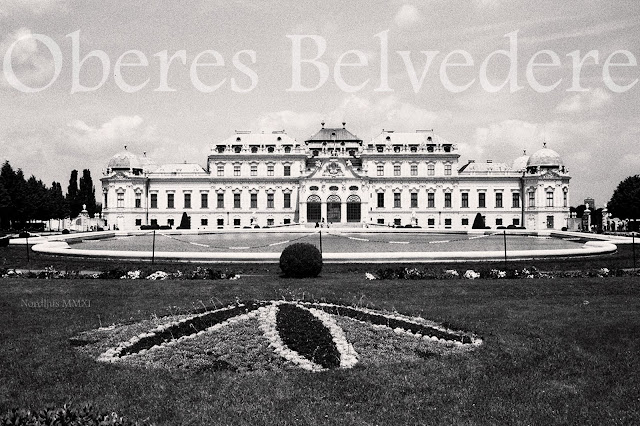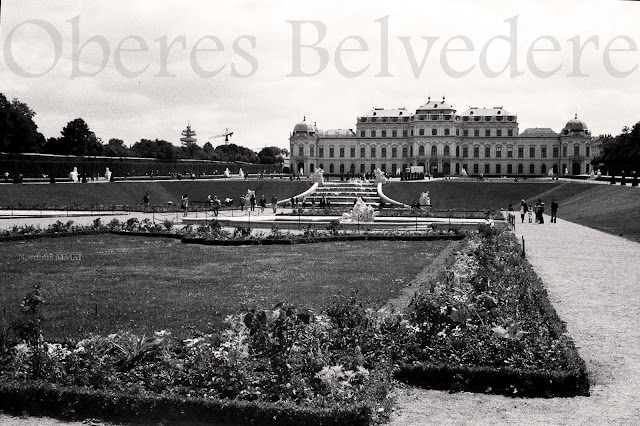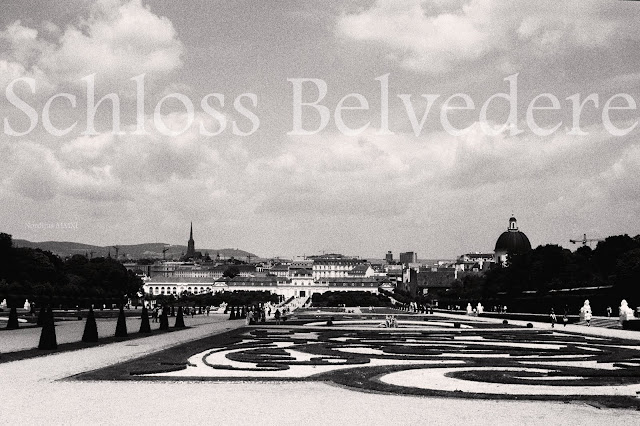During my visit to Vienna in May I carried my old Minolta camera with a black & white film in it around, along with my DSLR.
I'm still not happy at all about the qualitiy of the digital images, their graininess. Also some of the prints were rather (too) dark, so all needed a bit of Photoshop TLC :)
Vienna is a beautiful city, with the signs and remnants of the former Habsburg monarchy and Austro-Hungarian Empire all around. A city full of beauty, history, art, music, Kaffeehäuser (Viennese cafés), architecture, tradition, old and modern. Here's a little tour of some of the sights and places of interest.
Wiener Naturhistorisches Museum / Museum of Natural History Vienna (NHM): One of Austria's largest museums and one of the most important museums of the world. Opend in1889, the museum has 25 million objects and offers 39 exhibition halls to wander through and marvel. Once of the most important and unique objects is the 25.000 years old Venus of Willendorf. A wonderful place to spend an afternoon - or even a whole day.
Wiener Karlskirche / St. Charles's Church Vienna: A beautiful baroque / rococo church, completed in 1737, in Vienna's 1st district.
 |
| Oberes Belvedere / Upper Belvedere |
 |
| Oberes Belvedere und Garten / Upper Belvedere and garden |
 |
| Blick vom Oberen Belvedere auf Garten und Unteres Belvedere / View of garden and Lower Belvedere |
Schloss Belvedere / Belvedere Palace: Baroque palace, consisting of the Upper and Lower Belvedere, built as summer residence for Eugene of Savoy. The Upper Belvedere houses an extensive collection of Austrian Art from different centuries, including the greatest collection of Gustav Klimt.
Wiener Secession / Vienna Secession: Also
Vereinigung Bildender Künstler Österreichs / Union of Austrian Artists, formed in 1897. The movement included painters, sculptors and architects and Gustav Klimt was its first president. The Secession building in the Viennese Art Nouveau style was built in 1898.
Wiener Riesenrad / Vienna Giant Ferris Wheel: Vienna's giant ferris wheel is one of the earliest ferris wheels. It was errected in 1897 to celebrate the golden jubilee of Emperor Franz Josef I. It is situated at the entrance of the
Wiener Prater (Wurstelprater), a large amusement park in Leopoldstadt (Vienna's 2nd district).
Schloss Schönbrunn / Schönbrunn Palace: Former imperial summer palace, situated in Hietzing (13th district). Built between 1637 and 1643 for empress Eleonora Gonzaga. After severe damages in 1683, emperor Leopold I. (1640-1705) ordered a new palace to be built for his successor Joseph I. in 1687. From 1743, empress Maria Theresia (1717-1780) had the palace altered and enlarged in the baroque style. The palace served as summer residence for the imperial family until the end of the first world war. The palace, together with its beautiful extensive gardens, is part of the UNESCO world heritage.
Spanische Hofreitschule / Spanish Riding School: Founded in 1565, the Spanish Riding School used to serve as riding school for the imperial family. It's famous for it's white Lipizzan horses and cultivates classical dressage. As a girl, when life was all about horses, I longed to come here and see a performance. Today, I'm quite happy with catching a glance of the stables while passing by :)
Fiaker: (Croatian and Serbian
fijaker, Hungarian
Fiáker), name for both the two-horse carriage and the coachman. The city's full of them, driving tourists around the city on sightseeing tours. I haven't been in one yet, it just seems a bit too touristy to me. Although it's nice to see them around - Vienna wouldn't be the same without them :)
Hofburg / Hofburg Palace: From the 13th century until 1918 residence of the Habsburg monarchy. Since 1945 seat of the Austrian President. There are now several museums in the former palace, as well as the National Library.
Burgtheater / (Imperial) Court Theatre: The national theatre of Austria, opened in 1748.
There are many more wonderful places to see, one visit to Vienna certainly isn't enough to do, see and experience everything. And a 36 images 135mm film roll certainly isn't enough to catch everything ;)




















